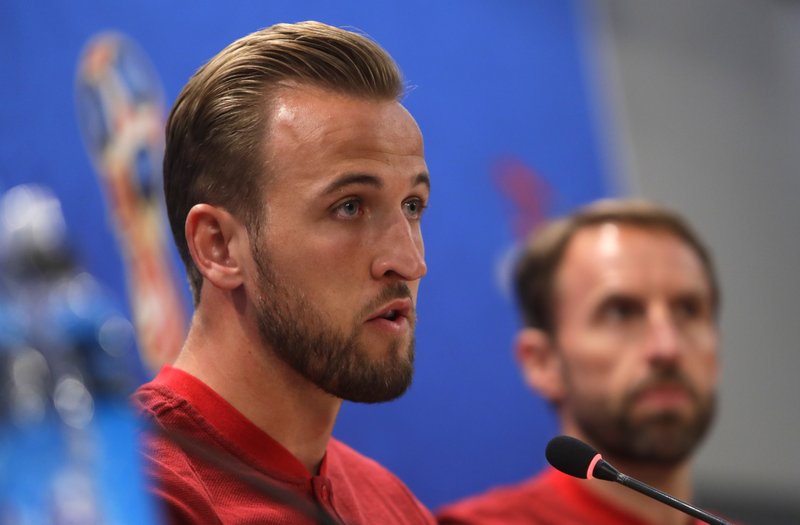
England’s Harry Kane answers a question at a press conference for the 2018 soccer World Cup, at the Volgograd Arena in Volgograd, Russia, Sunday, June 17, 2018. England play Tunisia in a group G match Monday June 18. (AP Photo/Alastair Grant)
VOLGOGRAD, England — Whatever happens to England at the World Cup, at least the reception facing the squad should be less brutal than it was in 2014 after its exit following the group stage.
For once, the players can’t be accused of hiding away, retreating behind their headphones. The hallmark of England’s preparations for Russia has been shedding the past reticence to engage with the public, a calculated move by the team leadership to reconnect with a public disaffected by years of failure at tournaments and uninspiring performances.
“They appear more relaxed. They appear more normal,” supporter Gavin Hughes said, overlooking the Volgograd Arena where England opens its World Cup campaign against Tunisia on Monday. “They appear human. They are just lads playing football at the end of the day. That’s been the problem in the past. There’s more of a togetherness.”
A defining clip of the 2010 World Cup was Wayne Rooney bellowing down the barrel of a camera after a 0-0 draw with Algeria: “Nice to see your home fans booing you, that’s what loyal support is.”
That disconnect with the public has been bridged by the 23-man squad facing the media in a 45-minute, Super Bowl-style session before leaving for Russia. The English Football Association’s approach is in a marked contrast to club duty where they are largely closeted away, save for appearances with paying broadcasters or often in controlled appearances.
“We’ve done a lot for the fans on social media so they can see what we are up to, which has not always been the case,” captain Harry Kane said Sunday. “It’s important while we have free time is to try to let the fans know what we are up to.”
The public is seeing a new side of the players. Not only are they more relatable but painted in a more sympathetic light, beyond the caricatures of millionaire mercenaries just chasing more money.
“That connection with the supporters is really important,” coach Gareth Southgate said. “There have been perceptions about our players for a long time … so it’s been really good for our public to see how much it means to the players to play, to see a different side of their personality.”
In a move unthinkable in years gone by, when a since-departed FA official blocked Rooney talking about his Christianity, defender Danny Rose recently opened up on his problems dealing with depression. Publicly praised by Prince William for raising awareness of health issues, Rose realizes how players can use their new platform to show their human side and inspire others.
“A lot of people messaged me to say thank you, that they know someone who is going through this or has been through that and that I’ve helped them and given them the confidence to express themselves,” Rose said. “We have a lot of down time and I’m going to think of something to help others when I get back. I’ve got time to think while I’m here and when I get back from the World Cup about how I can go forward and help people.”
It’s not just about the players feeding a voracious traveling media pack with material. Kieran Trippier, who is also Rose’s club teammate at Tottenham, told the left back he appeared no longer burdened by a private plight in England’s last World Cup warm-up game.
“I was playing with a bit of freedom,” Rose said of the victory against Costa Rica. “I think he’s got a point.”
Southgate is credited with encouraging the warmer environment, far removed from the controlling regimes under Fabio Capello and Gary Neville, who was Roy Hodgson’s assistant for the dismal 2014 World Cup and 2016 European Championship last-16 humbling to Iceland. A bemusing, running theme in the British papers at Euro 2016 in France was the players’ refusal to divulge any details of a darts tournament. The squad has been overhauled by Southgate and it has even been playing darts with the media at the World Cup base near St. Petersburg.
Southgate has been playing his part, going to fan forums in the buildup to the tournament to recognize the commitment and cost involved watching England abroad.
“Sometimes those really good people who follow us are overlooked at the expense of some who have caused problems in the past,” Southgate said.
Ultimately, results dictate the public mood and England hasn’t won a knockout game at any tournament since 2006.
“It’s about how we perform,” Southgate said, “but there’s a bigger picture.”